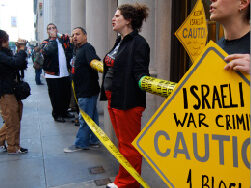

Stop the Wall and ItIsApartheid.org
invite you to participate in judging
THE INTERNATIONAL ISRAELI APARTHEID
SHORT FILM CONTEST
Visit our website until December 15 to watch and vote!
Sponsors:
BadilResource Center for Palestinian Residency and Refugee Rights. Code Pink- Women for Peace, USA. Palestine Freedom Project. Friends of Sabeel North America. ICAHD USA. Al-Rowwad USA. American Muslims for Palestine. AJJP Boston. USA,Palestine Campaign for the Cultural and Academic boycott of Israel.
Endorsers:
CooperativeSUTTVUESS (audiovisual production and postproduction), Italy. IJAN (International Jewish Anti-Zionist Network), Australians for Palestine Woman for Palestine, Melbourn Australia. Palestine Solidarity Committee, South Africa. Al-Alwad Palestinian Right of Return Coalition, USA. Ireland Palestine Solidarity Campaign. Coalition AgainstIsraeli Apartheid, Canada. Scottish Palestine Solidarity Campaign. Afro-Middle East Center, South Africa, Congress of South African Trade Unions. Tadamon, Montreal Canada.

In response to thisbill, members of the Zionist "Left" in Israel issued a "declaration of independencefrom fascism." Announced at a rally in Tel Aviv, the Middle East's mostethnically cleansed city (indigenous population: four percent), the declarationasserts that the proposed law "violates [Israel's] basic commitment to theprinciples of equality, civil liberty and sincere aspiration for peace --principles upon which the State of Israel was founded."
The Zionist "Left"is distancing itself from this policy, but the proposed oath is entirelyconsistent with Israel's racist foundations and continued ethnic cleansing -all of which the Zionist "Left" has played a central role in perpetrating andwhitewashing.

We are excited to announce the formation of a new IJANchapter in Atlanta, Georgia! Fivemembers attended the recent US Assembly of Jews and have returned eager to growand strengthen the presence of anti-Zionist Jewish activism in the A-T-L! If you are in the Atlanta area and areinterested in getting involved, please email us at atlanta@ijsn.net.

CONTACT
FOLLOW US
SUBSCRIBE TO OUR NEWSLETTER
BUSINESS OF BACKLASH
Click here to download the 120-report which exposes the funders of Zionist backlash on campuses and in communities
SEARCH THE SITE
NAVIGATION
WHO WE ARE
NEWS & OPINIONS
PROJECTS & CAMPAIGNS
CHAPTERS & SECTORS
RESOURCES
GET INVOLVED

